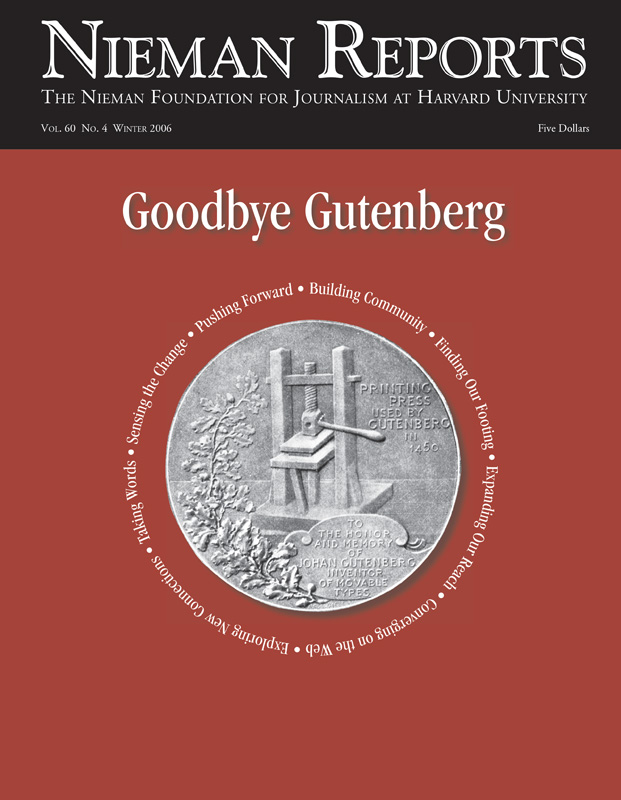"Adapt or Die" is the headline on an article from American Journalism Review posted on the bulletin board at the weekly newspaper I edit. Golly gigabyte, that sounds serious.
Life’s not easy for some of us who still remember typewriters—and typesetters. And management isn’t helping when it keeps sticking stories on the bulletin board suggesting newspapers are going out of fashion. The most recent posting on our board, this one from Publishing Executive (What do they know?) was headlined, "Have You Started Planning for E-Paper?"
"What is the e-paper," you ask? It’s evidently a "paper-thin, page-sized, flexible plastic monitor on which digital images can be displayed." An e-head who works here wrote on the posted clipping that "it’s easy to envision someone carrying a ‘tab-sized’ piece of e-paper which plugs into a PDA or phone."
It might be easy for him, maybe. Not so easy for me. All this downsizing of reading space sounds like a plot by optometrists, if you ask me.
But who would ask me? Linus carries a security blanket. I carry a pica stick (metal ruler) with me every time the production department calls. I borrowed it from the Columbus (Ga.) Ledger 50 years ago when Specialist Remer Tyson (also a Nieman Fellow) and I were in the army at Fort Benning and got to go "in town" in civvies once a week to oversee make-up of The (Fort Benning) Bayonet.
Reading teeny tiny print might not be a problem for many. Virgin Mobile is beaming novellas to cell phone users. They come in 160-character installments through two text messages a day for five weeks. The cost is five cents per message. Don’t look for "The Old Man and the Sea." Virgin’s first novella, titled "Ghost Town," about a homeless teenager, was written by one of its copywriters. The teenager probably got thrown out of his house for running up his cell phone bill or becoming addicted to porn on the Internet.
I am not going to knock this because, if it flies, many journalist victims of downsizing (a kinder form of laid off) could pay the rent by writing novellas. Just shorten that novel now gathering dust in the bottom right drawer of your desk.
Graduates of Northwestern’s Medill School of Journalism, we discover, will be expected to have learned how to tell their stories "across all of the print and digital platforms in words, audio and video." To do that, they will train for this new era of journalism by heading out the door with a laptop computer, digital audio and video recorders, and video iPods. Presumably chiropractic care will be a new demand of The Newspaper Guild.
Does my attitude personify generational differences? Possibly, but don’t despair. A recent story in Parade magazine assured its readers, I mean audience, that "old dogs can learn new tricks." A 10-year-old German shepherd was taught to sit, come, or go to bed on command. I can do all those things and more. It all depends, said Parade, on who gives the command. My view: People can adapt to anything if the order comes from the person who signs the paychecks.
Of course age is a factor. The Wall Street Journal reported that anyone under 30 "grew up with the Internet in one hand and a cell phone in another." Sure, but they have to put one down to drink a beer.
My multitasking is limited to reading a newspaper while I watch "House." And when the show’s over, I frequently have to ask my wife, "What disease did he have?"
I do detect the onset of schizophrenia at newspapers. Most papers beg readers to go to their Web sites. But The New York Times Web site urges us to "Think Outside the Screen" and follows with a $2.99-a-week subscription offer to receive the paper version.
Last December, I wrote a column about my newspaper being "on the cutting edge" and, tongue in cheek, announced that we’d be selling "Hipods" for $9.99 "cash and carry." The Hipod, I explained, was solar-powered, the size of a driver’s license, and fits in one’s wallet, while combining a computer, cell phone, camera, A-GPS receiver, calendar, address book, voice recorder, bottle opener, and flashlight. Most important, my weekly newspaper’s stories would be posted to it as they are being written. Why wait until Wednesday to read my words?
Two readers called to buy one.
The acceptance of new ideas is an individual thing. When I go on a trip, I have found AAA’s maps and directions vastly superior to those I find on MapQuest. When I rent a car, I decline navigational devices that tell me to "turn right in 100 yards." I’ve found my wife’s directions to be a lot more dependable and her commands a lot more familiar.
But where the improvement is undeniable, I join right in. Those Crest Whitestrips really do work.
Joe Zelnik, a 1970 Nieman Fellow, is editor of the Cape May County Herald in New Jersey.


